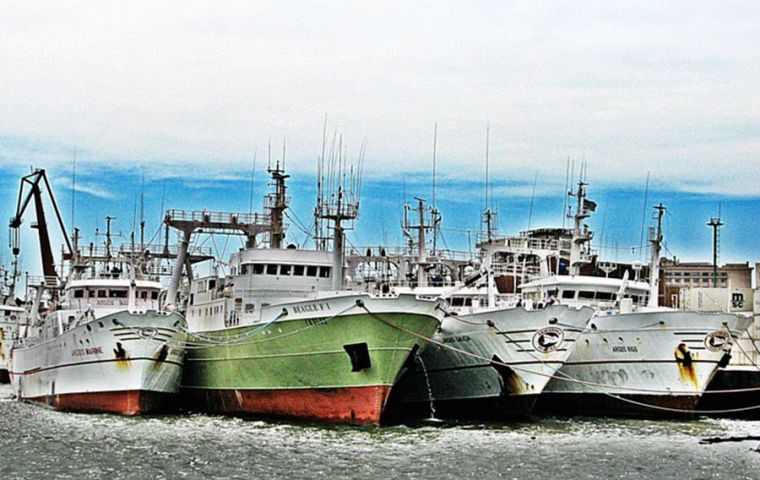MercoPress. South Atlantic News Agency
Montevideo port loses lure for Falklands licensed Spanish fishing fleet
 An overview of the port of Montevideo and the fishing vessels docking area
An overview of the port of Montevideo and the fishing vessels docking area At least four Spanish fishing vessels, which normally operate in the South Atlantic, most of them with Falklands' licenses, left for Vigo and Marin in Galicia, avoiding transshipment operations in the port of Montevideo, Uruguay, according to the country's leading Maritime and ports information report.
The vessels are “Costa do Cabo” with some 780 tons, “Playa Pesmar 1” 1.000 tons, “Playa Pesmar 2” 700 tons, “Pesca Vaqueiro” 1.100 tons. And Freimar UNO with 650 tons of squid could follow.
“The overall operation involved 3,850 tons of squid, equivalent to 40 feet 123 containers, and apparently another two vessels, Farruco and Fakir, also left without unloading some 800 tons of squid”, points out the report, which means a tremendous loss of activity and working hours for the port of Montevideo.
Furthermore two other Spanish vessels that had contracted maintenance jobs at the Montevideo Tsakos dry dock, cancelled the order and have chosen dry dock facilities in the island state of Cape Verde in Africa.
The first indications of Spanish disappointment with Montevideo were reported in Galicia's main daily “El Faro de Vigo” indicating that some forty of Spain's squid fleet operates in the South Atlantic, and most of them have as a concentration point at the port of Montevideo. Likewise for many trawlers and longliners in the South Atlantic and the Pacific, Montevideo provides bunkering, logistics, transshipment, crews' shifts plus supplies and repairs.
But Montevideo is increasingly becoming a calling point for the growing Asian Fleet, which “is depleting the South Atlantic fisheries”, according to the report.
“The lack of space in Montevideo is an endemic hurdle”, pointed out to Faro de Vigo the president of the Vigo Cooperative, ARVI, Javier Touza who added that on occasions fishing vessels must stern dock. To this must be taken into account the high costs of Montevideo port, even more complicated now with the Covic 19 pandemic.
“For this reason the Galician fishing vessels are fleeing from Montevideo looking for better conditions in alternate ports or returning to Galicia. In our case we have moved our three vessels to Cape Verde”, Mr. Touza said.




Top Comments
Disclaimer & comment rulesCommenting for this story is now closed.
If you have a Facebook account, become a fan and comment on our Facebook Page!